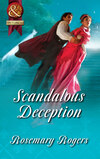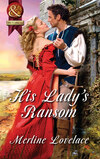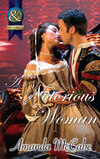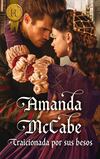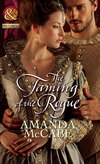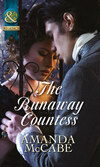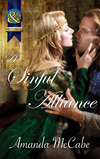Loe raamatut: «High Seas Stowaway»
A stowaway. Balthazar had not time to deal with such annoyances. Not now, when his thoughts were full of Bianca.
“Mendoza!” he shouted. “Turn back to Santo Domingo. We have a knave to set ashore.”
Balthazar reached down to grasp the lad by the collar of his doublet, knocking his cap askew. One long, dark brown curl escaped, falling along a startlingly graceful neck.
The stowaway shoved Balthazar’s hand away, standing up straight as he/she pulled off the cap. Bianca glared up at him, shaking her hair free over her shoulders.
“You cannot turn back, Captain Grattiano,” she said. “The wind is against you.”
As Balthazar stared at her in utter astonishment, he heard someone roar with laughter. “Looks like we have a new crew member, captain.”
“I can swab a deck or mend a rigging rope with the best of them,” Bianca declared. Her words were bold, but her eyes—her eyes still held that deep caution. That distance.
A distance that had suddenly grown much narrower.
Balthazar caught her against him, his lips coming down hungrily on hers as his crew broke into raucous cheers.
HIGH SEAS STOWAWAY
“Smell the salt spray, feel the deck beneath your feet
and hoist the Jolly Roger as McCabe takes you on an
entertaining, romantic ride.”
—RT BOOKreviews
A NOTORIOUS WOMAN
“Court intrigue, poison and murders fill this
Renaissance romance. The setting is beautiful…”
—RT BOOKreviews
A SINFUL ALLIANCE
“Scandal, seduction, spies, counter-spies, murder, love
and loyalty are skilfully woven into the tapestry of
the Tudor court. Richly detailed and brimming with
historical events and personages, McCabe’s tale weaves
together history and passion perfectly.”
—RT BOOKreviews
High Seas
Stowaway
By
Amanda McCabe

Amanda McCabe wrote her first romance at the age of sixteen—a vast epic, starring all her friends as the characters, written secretly during algebra class.
She’s never since used algebra, but her books have been nominated for many awards, including the RITA®, Romantic Times Reviewers’ Choice Award, the Booksellers Best, the National Readers’ Choice Award, and the Holt Medallion. She lives in Oklahoma, with a menagerie of two cats, a pug and a bossy miniature poodle, and loves dance classes, collecting cheesy travel souvenirs, and watching the Food Network—even though she doesn’t cook. Visit her at http://ammandamccabe.tripod.com and http://www.riskyregencies.blogspot.com
Previous novels by the same author:
TO CATCH A ROGUE* TO DECEIVE A DUKE* TO KISS A COUNT* A NOTORIOUS WOMAN^ A SINFUL ALLIANCE^
* Linked by character
^ Linked by character to HIGH SEAS STOWAWAY
MILLS & BOON
Before you start reading, why not sign up?
Thank you for downloading this Mills & Boon book. If you want to hear about exclusive discounts, special offers and competitions, sign up to our email newsletter today!
Or simply visit
Mills & Boon emails are completely free to receive and you can unsubscribe at any time via the link in any email we send you.
Prologue
Venice—1525
He was there.
Bianca Simonetti stared down from her narrow bedroom window, peeking through the merest crack in her curtain to the young man who stood on the narrow walkway far below. Though she could see little but his pearl-trimmed red velvet cap, the glossy fall of his dark hair on his shoulders, she knew it had to be him. Balthazar Grattiano.
For no one else in all her fifteen years had ever made her heart beat as he did. It pounded now in her breast, the rush of nervous blood loud in her ears. Her very fingertips and toes tingled with hot, nervous life whenever she just looked at him!
She knew that she was far from the only female in Venice he affected this way. His dark green-gold eyes, muscled shoulders and elaborate codpieces were the subject of many whispered, blushing confidences from patrician salons to two scudi brothels all over the city. Bianca heard much of it, for all those women, countesses and whores alike, came to her mother with their secret desires.
Maria Simonetti, long a widow with her own household, was the most gifted fortune-teller and tarot-card reader in Venice. She could not practise her trade openly, of course; Venice was not the strictly religious enclave Madrid was, but no one wanted to court charges of witchcraft. So, the lower stories of their house were let to a dressmaker and a wigmaker, while Maria told her fortunes in a back room, discreetly draped and curtained.
But everyone in the city knew, in their own unstated way, of Maria’s gifts. The women especially. They came seeking a glimpse of their future, assurances about their husbands or lovers or businesses. They came in tears, in hope, even sometimes in elation. And, very often, they came with anxious questions about Balthazar Grattiano. They never noticed Bianca, sitting so quietly in the shadows, and she heard them all.
Balthazar was handsome, one of the most handsome men in Venice. That was obvious just to look at him, of course. He was rich, the only son of the fabulously wealthy and powerful Ermano Grattiano. He was also now nineteen, of an age to marry, to take on the responsibilities of a patrician gentleman. Yet he did not seem inclined to do any such thing, preferring to spend his time with courtesans, gambling, drinking, or, most shocking of all, watching the ships being built at the Arsenal.
Bianca heard all this, heard the whispers of his great “inventiveness” in bed, his mystery and elusiveness. Heard the blushing pleas—would he one day marry her? Make her his exclusive mistress?
But Bianca knew more than his good looks, his riches, his sexual prowess. She looked into his luminous dark green eyes and saw a longing to match her own. A deep, endless pool of vast sadness.
She did not have her mother’s gifts. The cards were just painted pasteboard to her, the future a blank. But from her infancy she had been taught about people. Had seen them come and go in her mother’s house, heard their deepest fears and wishes, their goodness and their malevolence. She could read them, in her own prosaic way. When she first saw Balthazar, first looked into his beautiful eyes, she saw not the smug satisfaction expected of such a privileged young man. She saw only that sadness—and that swirling pool of anger.
In her everyday life, she would not expect to meet anyone like Balthazar Grattiano. They were not of the same status, and their lives did not overlap. Her mother did not mind Bianca listening to fortune-telling sessions. Maria was open about the realities of life, but she was also protective. Bianca was not allowed to go dancing with young men, or even to leave the house at night. Especially during this season of Carnival. She heard only about the masked, wine-fuelled parties from her mother’s visitors.
But Balthazar’s father, the powerful and fearsome Ermano Grattiano, had recently begun coming to the house, seeking card readings from her mother. Maria sent Bianca away when he was there, but she heard from the maidservant that Ermano, who had buried three wives, wished to marry again. He was passionately desirous to have more children, and was convinced Maria could tell him the right lady to bear those babes, convinced the cards would reveal his wife, his destiny.
Balthazar sometimes came with his father to these sessions, always waiting outside on the walkway. That was when Bianca first saw him, one day as she came home from the market. He leaned against the peeling stucco wall, wrapped in a rich fur-trimmed cloak, a book open in his hands.
Bianca, too, loved to read, a strange accomplishment for a young woman. She also learned languages, English and Spanish, and account-keeping, to run her own business one day. A bookseller on the Rialto sometimes loaned her volumes, yet never enough to satisfy her vast desire for knowledge. Her curiosity as to what such a handsome, well-dressed man was doing reading outside her house overcame her usual shyness, and she asked what the book was.
He glanced up at her, and that was when she saw it—that great sadness, that barely leashed fury against she knew not what. He never seemed to turn that anger on to her, though. Instead, he smiled, and showed her his volume on navigation, surprised she could read the Spanish words. After that, whenever Ermano would come to discover more about his destined bride, Bianca would slip down to talk to Balthazar, to see what he was reading, to talk about the strange glories of the world outside Venice. The wonders of England, Spain, France, Turkey—even the new islands beyond the seas.
Bianca had never heard anyone speak of such things, and she was fascinated by this new vista of great lands. Fascinated by Balthazar himself, by this tiny glimpse of wishes and dreams hidden so deep beneath a glittering and careless façade. By this burning desire to run away, to soar free into some unknown fate.
But it frightened her, too, this view outside her narrow existence. This strange, wondrous young man.
“Why,” she asked him once, “would you want to leave Venice? You have everything here.” She could not imagine then that anyone could desire more than riches and fame, an old family name, which Balthazar possessed in abundance. Could not imagine someone would desire more than Venice, which was all the world and more, a sparkling golden place on the water. She herself would surely one day marry and raise a family, help run her husband’s business, and be bound to her home and duties. Her only consolation was that it would be here, in Venice.
Balthazar—he had no need really to go out and seek his fortune, as those who travelled to the New World did. It lay at his very feet, wherever he walked. Money, glory, love. How could he want to leave it all?
But he merely smiled at her, that sweet, sad smile, his beautiful eyes old. So very old. “Come with me, Bianca,” he said, taking her hand. It was the first time he had touched her, his fingers cool and strong over hers. She shivered at the sudden rush of pleasure, the joy even such a casual, innocent caress had on her senses. She held so tightly to him, not caring where he led her. She would surely walk into the very flames of hell, if it was with him.
But he led her not into brimstone, only to the edge of the nearest canal, where his father’s gondola waited. People hurried past them: maids with their market baskets; serious patricians in their black robes, intent on affairs of state; satin-clad courtesans who smiled and giggled at Balthazar. Bianca saw, heard, none of them. It was as if she was wrapped in a silent, sundrenched spell. In the presence of Balthazar, his warmth, his clean, seawater scent, that blocked out the noise and fury of the everyday world.
“You see this water?” he said, gesturing to the canal below them.
Bianca nodded absently. Of course she saw the water! She walked past it every day on her errands. It was like every other canal in Venice. Smelly, perhaps, but unremarkable. A way to get around.
“No, really look at it,” Balthazar said, tugging on her hand, and she glanced down. The water was still with no gondolas passing to churn its waves, an iridescent swirl of blue, purple, green, a greasy black. A few bits of flotsam bobbed about, bottles, scraps of vegetables, a dead rat or two. Winter was coming on swiftly, and the usual sweet-sick smell was muted.
“What am I looking at?” Bianca whispered, making him laugh.
“We see here only the surface of the city,” he said. “The beautiful churches and palazzos, the jewels and silks, the riches that are the envy of the world. But beneath that beauty…”
Bianca watched the slow swirl of the water, the blend of dark rainbow colours that concealed garbage and decay deep beneath. “Dead bodies? Chamber pots?”
Balthazar glanced at her, his brow raised. The sunlight caught on the fine emerald in his ear, dazzling green-yellow set in elaborate filigree. The jewel was also a concealment. Balthazar, too, was like the waters of Venice, like the city itself—beauty masking dark depths.
“Exactly, Bianca,” he said quietly. “Death and decay. Dishonesty at every turn.”
“But can you really run from such things?” she asked, thinking of his books of travel and adventure, of new lands. “They are surely always with us. We are only ourselves, no matter where we go.”
“True enough,” he said. “We can only try to make amends, to find truth. To purify our own souls. Only then can we be free of what lies beneath, what we never dare reveal to the world. We can only seek the truth, at any price.”
The truth at any price. Balthazar fascinated her more than ever at that moment, but also scared her. For an instant it was as if she glimpsed his very soul, so dark and labyrinthine, as hidden as the waters’ depths. It was only a glimpse, a fleeting moment, before all was concealed again behind his smile. He held her hand even tighter in his and led her back home, gallantly kissing her fingertips before she fled back to the safety of her own chamber.
It had been many days since that last encounter, and Bianca had only glimpsed him for quick instants. It was truly Carnival now, and he was occupied with his own social obligations. Ceremonies and festivals, banquets, balls—lounging in velvet-cushioned gondolas with beautiful blonde courtesans. Bianca had seen him thus with the notorious Rosina Micelli, his head tipped back against the gold-embroidered cushions, eyes closed in decadent pleasure as Rosina whispered in his ear, her jewelled hand stroking his hair.
He and his father had not been back to Bianca’s home until today. Rumour had it that Ermano was courting the perfumer Julietta Bassano, and Balthazar was occupied at the brothels and gambling halls. Bianca peered down at him now from her window, unsure what to think or do.
Even though she had not spoken with him in days, she had thought of him at nearly every moment. Turned his cryptic words about decay and truth over and over in her mind until she was dizzy with it. She longed to ask him what he meant, craved one more privileged glimpse into his hidden heart. Wanted to show him her own.
Yet at the same time she wanted nothing more than to run from him! From those dangerous truths he offered like emeralds.
Bianca let the curtain fall back into place, turning to the small, precious looking glass on the wall. She was too thin, with curling dark brown hair that refused to lighten no matter how much lemon juice she applied. Her cheeks were hollowed, her eyes too large for her face, her shoulders bony, and she had no bosom to speak of. But now, as she thought of Balthazar Grattiano standing so close outside, her pale skin glowed pink, her brown eyes were bright.
Yes, he was a strange and frightening person, unpredictable, unreadable. Not like anyone else she had ever known. If she were wise, she would stay far away from him, from all the dangerous Grattianos. Yet Balthazar made her feel alive and excited; he was like the heat of the sun on a grey, drab day. And she was powerless to turn away from that wondrous light.
Soon enough, he would be gone completely from her workaday orbit. No matter what he said about freedom and truth, about the wide new world, he would have to marry a fine patrician lady and take on his own responsibilities. Take his fearsome father’s place of great power and influence. There was no escaping one’s true place in life, for either Balthazar or her.
She had to seize the few moments left, when she could see him, talk to him. Maybe even touch his hand again. Such beautiful, fleeting seconds would have to last her for a long time, once she was married to a respectable tradesman with no dark depths to his soul. No mossy green eyes that burned her very heart with their intensity.
Bianca smoothed her brown curls back, securing them as best she could with combs and pins. She discarded her apron, wishing she had time to change into something finer than her blue-striped work dress. But there was not a moment to lose, if she wanted to speak with Balthazar before his father finished hearing the message of the cards.
She spun around and dashed out of her room, hurrying down the back staircase. The house was quiet today, as their tenants were off to watch a play in the Piazza San Marco and the servants were at market. From her mother’s small room at the end of the corridor, Bianca could hear the hum of voices. Her mother’s tone was low and soothing, as it always was. Ermano Grattiano’s was strained, argumentative, angry. So foolish of him. Didn’t he know by now one could never quarrel with the cards?
Bianca snatched a blue wool cloak from its peg by the door and slipped outside, not bothering to change from her thin house slippers. Balthazar was still there, leaning against the wall. He did not read today, just watched the quiet walkway, his handsome face unreadable, his arms folded over his chest, as if he was deep in thought.
But perhaps his air of indifferent mystery was merely a product of too much Carnival, Bianca thought wryly. Of too much dancing and wine and debauchery. Their dressmaker tenant had told her all about a grand masked ball at the Piazza San Marco that had gone on until dawn. No doubt Balthazar had been there, too, with Rosina Micelli.
She longed to ask him about it all, to ask if the distant revelry she listened to from her window was as glorious fun as it seemed. Ask if he loved Rosina, or one of the other blonde courtesans. But she could not. She just leaned next to the wall beside him, and eventually he silently held out his hand to her. She slid her fingers into his cool, ungloved clasp, feeling the weight of his jewelled rings against her skin, the tenuous silken thread that was their connection.
“Do you not want your cards read, as your father does?” she asked.
Balthazar laughed harshly. “My father is a great fool, always thinking his future will change simply because he wills it so.”
“You don’t think we can change our future?”
“Nothing ever really changes, does it, Bianca? We all go on in the same way, day after day, trapped. I don’t need the cards to tell me what my life holds.”
Bianca gazed up at him in silence, at the smooth, perfect beauty of his face that concealed so much pain. Perhaps he was right not to see what the cards revealed about him, just as her mother was right not to tell Bianca’s fortune no matter how much she begged. Hope in the unknown future was sometimes all poor mortals had.
“What of the world in your books?” she asked.
“What of it?”
“Surely the future is anything but predictable there. Especially in those Spanish lands over the sea. It’s a new world, is it not, where a person could be or do anything. Discover a life that is wondrous strange, and old ways have no place. We—you—could be whatever you wanted. Not even the cards could say what.”
He smiled at her. “No more Balthazar Grattiano?”
“No more Venice, even.”
“It sounds a dream-world indeed.”
“Of course. But is it not there, in your books? Others have seen it, written about it. Why couldn’t we?” Bianca felt her excitement growing, expanding like a silken banner in the wind as she thought of it all. Of new, unknown shores. Her old fear burned away at the thought of no more Venetian society, no more strictures, even as she knew it was impossible.
Balthazar laid a gentle hand on her cheek, his smile rueful as he gazed down at her. “You are a dreamer, then, my practical Bianca.”
“Are you not as well?” she said, leaning into the warmth of his touch. The revelry of the sound of her name in his voice—“my Bianca.” “If you don’t wish to dream, to dare, why do you read all those books? Why do you study ships and the sea? If you truly think there is no other life than this, no chance to make a change, why bother? Why not just follow your father’s ways of thinking and being?”
His smile darkened at the edges, his touch falling away from her. “I am not like my father.”
Bianca knew that. Balthazar did not have his father’s air of easy contempt towards his inferiors, of assured, comfortable confidence. She saw Balthazar’s great struggle against all the feared Grattiano name meant, even if he did not speak his anger aloud. But before she could open her mouth to tell him so, to assure him she understood, the door to her house opened with a resounding crash.
She and Balthazar sprang apart as Ermano stormed out. Bianca eased back into the shadows for fear he would notice her, and turn that icy glare of his pale green eyes on to her. If Balthazar’s touch held the warmth of the summer sun, his father carried naught but the freeze of deepest winter. A killing chill.
She raised the hood of her cloak over her hair, watching Ermano warily. His bearded face was white with fury, as it always was after a reading of the cards. The gods of fortune had failed him yet again. His gaze scanned the walkway, and he gestured to Balthazar, not even looking directly at his son.
“Come, Balthazar,” he said tonelessly. “Let us leave the stench of this hovel behind us. I have had enough of its foulness.”
As he turned to stride towards the canal and his waiting gondola, his ermine-lined cloak swung back to reveal his white brocade doublet. Bianca let out an involuntary gasp, pressing her fingers hard to her lips to hold back the sound.
One of the fine sleeves was stained with crimson blood.
Balthazar’s face, too, turned pale. As white and still as an indifferent marble statue.
“Balthazar!” his father called imperiously. “Come, I do not have all day for you to dally with the maidservants. I have an errand at Signora Bassano’s shop.”
The words seemed to galvanise Balthazar to action. He wrenched one of the rings from his fingers, a large ruby surrounded by pearls. He pressed it, along with a bag of coins, into Bianca’s frozen hand.
“Just in case you need it,” he whispered in her ear. “Remember the new world, Bianca.”
Then he, too, was gone, and she was alone in the shadows of her house. She stared down at the ring, at the stone as dark red as the telltale blood on Ermano’s sleeve. The silence around her was heavy, deafening, a living, palpable thing. It was as if she was the only breathing thing left on the street. In the whole decaying city.
Surely that blood could not mean what her horrified imagination conjured. Surely it was just some bizarre ritual involving chicken hearts or goat livers, as she read about secretly in her mother’s forbidden books.
But she could not dismiss the whispered tales she heard of Ermano Grattiano, of his cold ruthlessness. Of the danger to anyone who became involved with him.
Bianca felt a haze of dreamlike unreality settle around her, like a drugging fog. She slipped the ring on to her finger and crept into the house, even as all her instincts screamed at her to run away. Whatever waited for her, she could not hide from it for ever.
The soft soles of her slippers made only a whisper of sound on the tiled floors as she tiptoed down the narrow, darkened corridor. Her mother’s work room, where she met with those seeking her counsel, was at the end, the doorway concealed by a heavy velvet curtain.
Before she even stepped through that portal, Bianca could smell it. The sticky, coppery tang of blood. The miasma of vanished life.
She eased back the curtain, peering into the little chamber. Silvery incense smoke still hung in the air, its sweetness blending sickeningly with the blood, the remnants of Ermano’s bergamot cologne, the tang of spilled wine. Atop the round table was a jumble of cards, goblets tipped on their sides. The stools were knocked askew on the floor.
And Bianca could see her mother’s foot behind the purple tablecloth, the torn hem of her white gown.
Still caught in that stick web of dreams, the piercing numbness of ice, Bianca stumbled around the table and the broken stools. Her mother lay in a crumpled heap on the tiles, her eyes wide and staring, glasslike, into nothingness. Her long, dark brown hair spread around her, matted by the blood from the gaping wound at her breast.
The wound caused by the dagger still poised there in her body, its emerald-set hilt glinting in the gloom and smoke. The dagger Bianca had seen often enough in the sheath at Ermano’s waist.
She knelt slowly next to her mother, reaching out to lightly touch the cold hand. Bianca could see it all in her mind, as horrifyingly sharp as if she had witnessed it herself rather than mooning over Balthazar Grattiano outside, listening to his faradiddle about truth and new lives. She saw Ermano in a rage when the cards would not tell him what he wanted, saw him destroy the instrument of his frustration—her mother. Then he just walked away.
Bianca remembered the rumours. Ermano Grattiano destroyed who and what he chose, anyone who thwarted or angered him. It was even said that, years ago, he had murdered his own mistress, the beautiful Veronica Rinaldi. He never paid for his crimes, of course, and anyone who tried to hold him accountable, who even witnessed his evil deeds, soon vanished themselves.
Bianca stared in horrible fascination at that dagger. Ermano would surely be back for it, if nothing else. It was too valuable, too distinctive. He would be back to clean up his deed. Or he would send Balthazar to do it for him.
Had Balthazar just been using her, then? Using their ruse of friendship to help his father in this evil scheme? Betraying her feelings for him?
A sudden spasm of bone-deep grief and fear seized Bianca, banishing that distant, numb dream, those last hopes. Her hand tightened on her mother’s, and a ragged sob escaped her lips. Her mother was dead, at the hands of a terrible, and terribly powerful, villain. And she, Bianca, was trapped. If she stayed, if she confronted the Grattianos and took the revenge her heart cried out for, then surely she would also end up dead. A dagger in the heart, and then tossed into the canal to rot alone in the swirling waters.
Who would avenge her mother then? Who would see that justice came to the Grattianos, if she was dead?
As Bianca knelt there beside her mother’s body, it was as if the sheltered girl she had been fell away like a warm cocoon, a concealing shawl that held her apart from the cruel world. A wall of new ice encased her heart, hardening her, steeling her resolve. Ermano might have killed her mother, while she was distracted by the all-too-handsome Balthazar. But they would not destroy her. Instead she would be the instrument of their destruction.
This was one crime of theirs that would not go unpunished. She was just a girl now, but that would not always be so. She knew what she had to do, come what may.
Bianca dragged the purple cloth from the table, scattering cards and goblets, and used it to cover Maria’s body. Then she hurried to a small carved chest in the corner, rummaging through the linens and boxes of incense until she found the bag of coins her mother always secreted there. Those, along with that the treacherous Balthazar gave her, would see her away from Venice, to a place of safety where she could study and plan. No doubt Balthazar had pressed the ring and money on her as some sort of salve for his guilt, or perhaps as a silencing bribe.
But she would use it to keep herself away from the Grattianos—and to help with their downfall one day.
For she would be back, somehow, and when she was it would be Grattiano blood that would flow at last.
Tasuta katkend on lõppenud.

